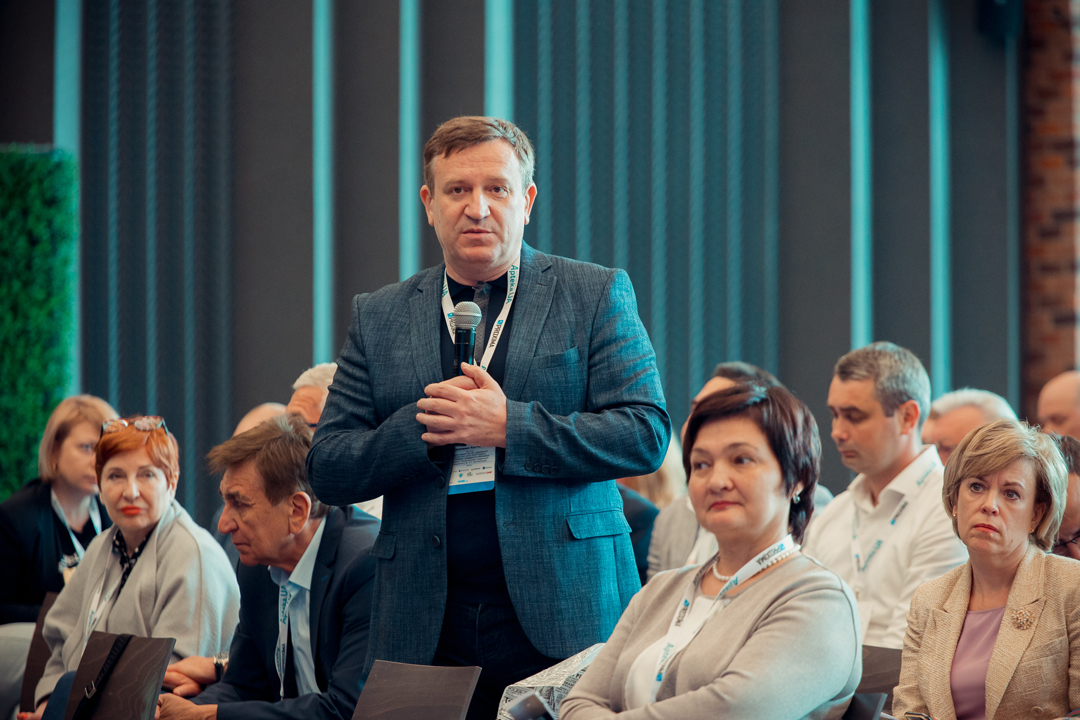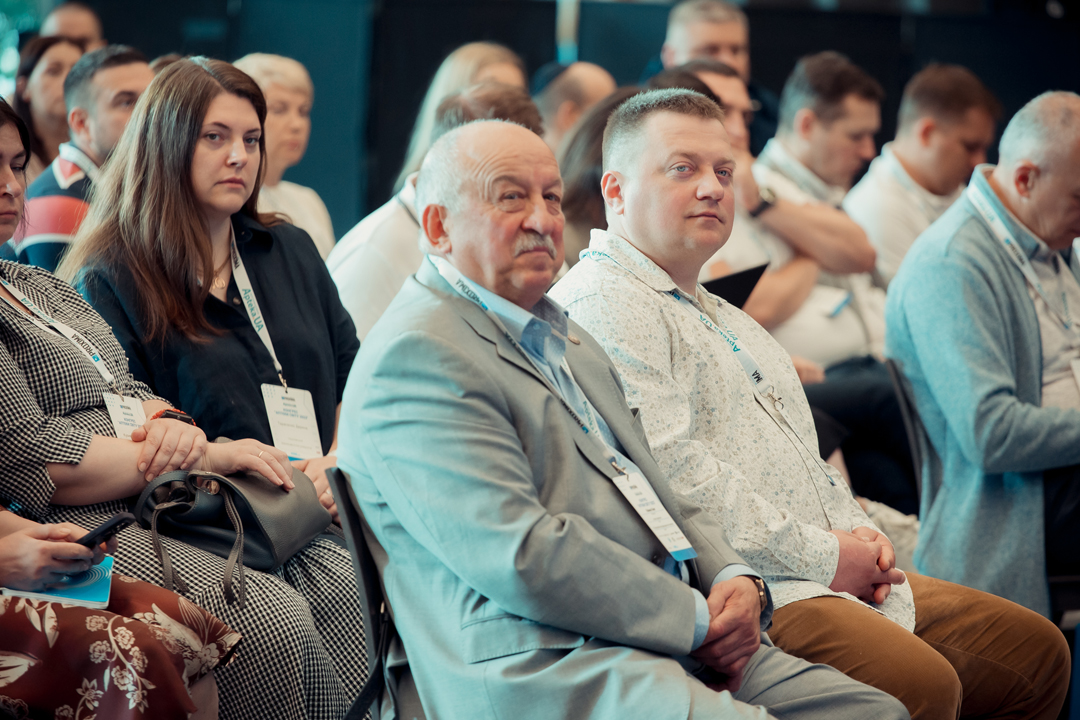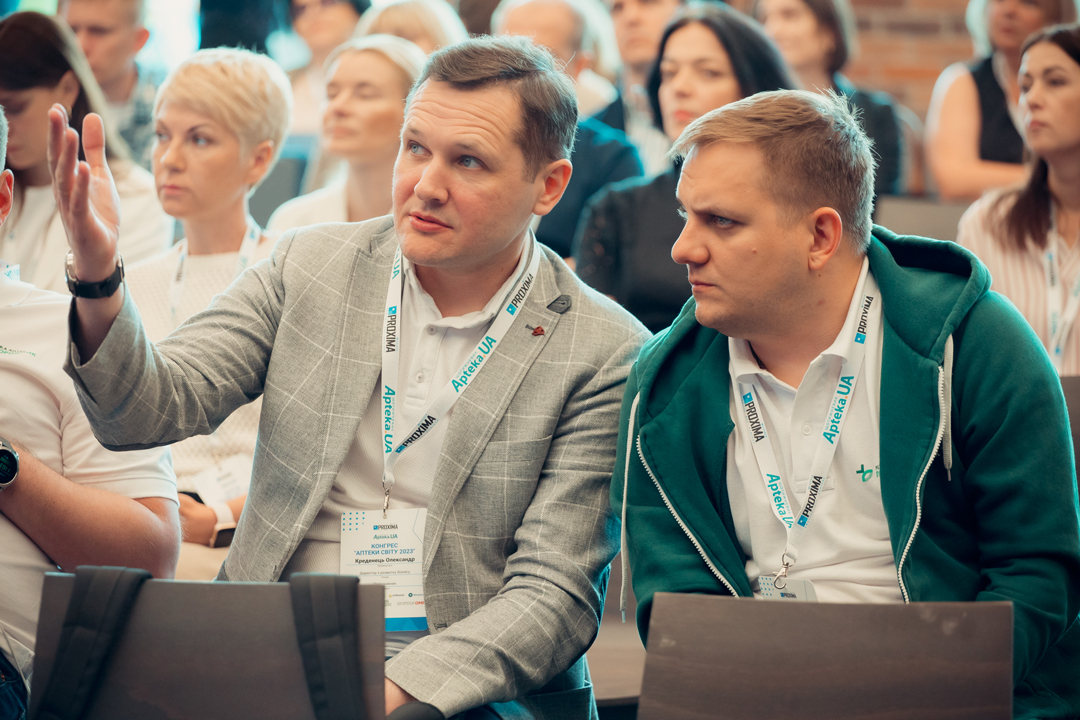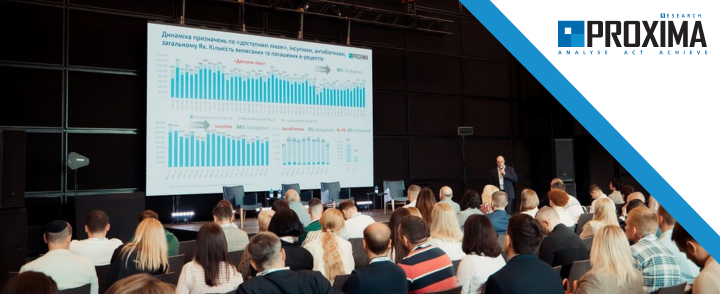On June 8, 2023, government officials, top management of the pharmaceutical business at various levels, professional associations, educators, and leading experts of the pharmaceutical market gathered in the capital to discuss the most relevant and painful topics of the industry.
The XII Congress “Pharmacies of the World 2023”, organized by Proxima Research International, is a leading event that brought together about 300 pharmaceutical professionals from all over the country and abroad. Further regulation of pharmacy activities, the first results of the introduction of electronic (e-) prescriptions for all prescription drugs, pharmaceutical personnel, education, and self-government are the key topics of discussions and debates at the World Pharmacies 2023 Congress.

The market expects the government to have a unified strategy for further development and decisive actions. This was stated by the moderator of the Congress, CEO of D.S. pharmacy chain Oleh Nikulyshyn, opening the panel discussion with government officials.
The relevant parliamentary committee has a lot of developments within the framework of its legislative work plan for 2023. This was announced by Sergiy Kuzminykh, MP, Chairman of the Subcommittee on Pharmacy and Pharmaceutical Activities of the Verkhovna Rada of Ukraine, Committee on National Health, Medical Assistance, and Health Insurance. He expressed hope that this year will be important for the development of uniform market rules.

In the near future, a draft law on regulating the circulation of special food products, dietary supplements, and other food additives will be made available to the public for review. A new draft law on the self-governance of medical professions in Ukraine is also expected.
Expanding Access to Medicines: Is the Right Path Being Taken?
Mobile pharmacies and the provision of medicines in rural areas were the main topics of discussion during the congress.
This year, the authorities took the initiative to introduce mobile pharmacy units, declaring a noble goal: to provide access to medicines for residents of villages without stationary pharmacies. According to S. Kuzminykh, the relevant amendments to the License Terms for the Conduct of Business Activities for the Production of Medicines, Wholesale and Retail Trade in Medicines, and Import of Medicines (except for active pharmaceutical ingredients) (hereinafter, the License Terms) are to be submitted to the Government in the near future.

But many questions remain open on the market side. First, a patient still needs to visit a doctor to purchase a prescription drug. Secondly, how can an e-prescription be redeemed at a mobile pharmacy if there is no stable Internet connection? Obviously, this is impossible without installing a satellite modem on the appropriate vehicle. Wouldn’t it be more appropriate to create favorable conditions for the dispensing of medicines through paramedic and obstetric stations?
According to Volodymyr Korolenko, Deputy Head of the State Service of Ukraine on Medicines and Drugs Control, the answer to the questions has strategic and tactical aspects. The results of the self-screening showed that more than 80% of the norms of European legislation have been implemented. The implementation of the new Ukrainian Law “On Medicinal Products” requires a lot of work. The issue of establishing a single state control body in the field of medicinal product circulation is already being considered.

According to V. Korolenko, the government is looking for opportunities to provide people with quality medicines.
Oleksandr Kotov, Head of the Department of Wholesale and Retail Trade of the State Service of Ukraine on Medicines and Drugs Control, spoke in more detail about the planned changes to the license terms for mobile pharmacy outlets. The analysis of the License Register for the Manufacture of Medicinal Products (in a Pharmacy) and Wholesale and Retail Trade of Medicinal Products showed that only 28% of the total number of pharmacies operate in rural areas.
It is planned that mobile pharmacies will operate in villages where there are no stationary pharmacies. As soon as a stationary pharmacy is opened in such a village, the pharmacy on wheels will cease to operate there. The licensee will be obliged to submit to the territorial body of the State Service of Ukraine on Medicines and Drugs Control and the local government the route of the mobile pharmacy. At the same time, such pharmacies will be allowed to sell both over-the-counter and prescription drugs.

Other government proposals to improve access to medicines for the rural population include simplifying the requirements for pharmacies in rural areas and the qualifications of pharmacy staff in rural areas. The relevant draft amendments to the license terms have already been developed and submitted for public discussion in May this year.
О. Kotov noted the problem of the low level of involvement of pharmacies in healthcare facilities in the reimbursement programs for medicines. In this regard, there are also developments of the State Administration on Medicines and Drugs Control, which include the obligation of pharmacies at hospitals to conclude agreements on reimbursement of medicines and medical devices with the National Health Service of Ukraine.
Under martial law, the State Service of Ukraine on Medicines and Drugs Control licenses business activities, but control, according to O. Kotov, unfortunately does not work in full due to the suspension of scheduled inspections, and unscheduled inspections are conducted in agreement with the Ministry of Health in the presence of a threat that has a negative impact on human rights, legitimate interests, life, and health.
The issue of providing medicine to Ukrainians in rural areas through paramedic and midwifery services deserves special attention. Thus, the licensing regulations stipulate that in rural areas, in the absence of a pharmacy, retail sales of medicines may be carried out by employees of these institutions with medical education on the basis of agreements concluded with the licensee. However, in practice, this mechanism does not work, as the pharmacy must dispense medicines either to the end user or to another licensed business entity, which does not include an employee of the paramedic and obstetric service.

Tetyana Kotlyar, Head of the All-Ukrainian Pharmaceutical Union “Pharmukraina”, clarified the issue of cash registers in the rural health posts. A paramedic cannot dispense medicine without a cash register. For its part, the pharmacy cannot register this cash register in the FAP either, since it does not carry out retail sales of medicines there.
According to S. Shayko, in order to make the mechanism of dispensing medicines through paramedic and obstetric stations work, it is necessary to amend the current legislation and introduce simplified conditions for licensing of paramedic and obstetric station employees, exempt them from the mandatory use of cash registers, and allow them to store and sell a limited list of medicines.
The participants of the Congress agree with this position: in the context of increasing the availability of medicines in rural areas, it would be more appropriate for the authorities to shift the focus from mobile pharmacies to regulating the sale of medicines through paramedic and obstetric stations.
The Pharmacy Professional Association of Ukraine, a non-governmental organization, sent letters to the State Service on Medicines and the Ministry of Health with proposals to analyze which settlements have a problem with the lack of medicines and the inability to deliver medicines there. Unfortunately, there is no answer. This was reported by Ihor Chervonenko, Chairman of the Board of the Pharmacy Professional Association and Director of Pharmastor LLC. If the State Administration of Ukraine on Medicines and Drugs Control cannot control the work of stationary pharmacies, how does it plan to control mobile pharmacies?

In response, representatives of the State Administration of Ukraine on Medicines and Drugs Control emphasized the agency’s readiness to continue the dialogue with stakeholders on the proposed topics.
“We are ready to take responsibility and funding and open pharmacies where they are really needed! First, tell us where they are needed.”
– Emphasized Mr. Chervonenko.
Volodymyr Rudenko, Director of the APAU, Doctor of Pharmacy, Professor, and Honored Healthcare Worker of Ukraine, mentioned the draft amendments to the License Terms to allow the licensee to use one website for e-retail by several of its legal entities rather than create a separate website for each legal entity. When will the market finally be able to use this opportunity?
S. Kuzminykh, in turn, assured that the relevant amendments to the license terms are expected in June or July this year.

Taras Kolyada, executive director of the Podorozhnyk pharmacy chain, also sees no point in introducing pharmacies on wheels. He noted that the regulator will not be able to track and fully control their work, and some stationary pharmacies even cover areas close to the active combat zone, or frontline areas.
Olena Prudnikova, Head of the All-Ukrainian Association Mykolaiv Pharmaceutical Association PharmRada, reported that there were no problems with the supply of medicines in villages. She shared with the participants her own experience of opening a pharmacy in a village during the war and emphasized that there are no problems with the supply of medicines, but the process of obtaining a license and opening a pharmacy is problematic.
Joining the discussion, Taras Lyaskovsky, Head of the Pharmaceutical Department of the Ministry of Health, assured the audience of the Ministry’s readiness to cooperate with the industry.
“I understand that you see certain problems in the implementation of this mechanism. We are open to a constructive dialogue, and if it is necessary to hold some constructive meetings that can draw attention to technical problems in the implementation of this project, we are ready to join.”
– He emphasized.

After listening to the opinions and ideas of the representatives of the pharmaceutical industry, T. Lyaskovsky suggested that the participants of the Congress prepare generalized, consolidated proposals.
“We are ready to work on them, especially since the rule-making process is ongoing. No final decisions have been made. We will provide comments or hold a joint meeting to understand the risks and analyze how effective the relevant processes will be. At the same time, I would like to emphasize that the government’s priorities include the proper provision of medicines to the rural population and the participation of pharmacies located in healthcare facilities in the “Affordable Medicines” program. That is why we are currently working on various existing mechanisms that can ensure the implementation of these priorities.”
– Added the Ministry of Health expert.
T. Kotlyar mentioned other pressing issues, such as possible delays in the supply of medicines to the reoccupied territories caused by organizational issues that licensees for the retail sale of medicines need to resolve in order to resume their work. Situations may arise regarding the activities of individual entrepreneurs when the licensee is registered in the occupied territory and its pharmacies are located in the reoccupied territory. Therefore, the supply of medicines is not carried out during the entire inspection period.
There are also periodic problems with the possibility of obtaining passes for drivers delivering medicines to remote areas and villages during the curfew period.
Following the lifting of the quarantine, which has now been extended until June 30, questions arise regarding the taxation of value-added tax:
- on transactions for the supply of medicines, medical devices, and medical equipment necessary for the implementation of measures aimed at preventing the occurrence and spread, localization, and elimination of outbreaks, epidemics, and pandemics of COVID-19
- the sale of medical devices and personal protective equipment that have been put into circulation on the basis of a notification from the Ministry of Health and do not meet the requirements of technical regulations. What to do with the remains of such goods?
T. Kotlyar drew attention to the fact that during the period of martial law, a provision was introduced that allowed issuing a conclusion on the quality of an imported medicinal product without the mandatory availability of a document confirming that the manufacturing conditions of the medicinal product comply with the requirements of good manufacturing practice, except for active pharmaceutical ingredients. However, the State Administration of Ukraine on Medicines and Drugs Control initiated the abolition of this provision, so if the relevant changes are adopted, the holders of the registration certificate and license for the manufacture of medicines will have to have such a document when importing medicines. Otherwise, there may be delays in the supply of medicinal products to the territory of Ukraine.

In general, numerous comments from business and professional community representatives summarized that the government and the pharmaceutical industry are currently working from both sides. The executive authorities do not communicate openly with the industry. On the other hand, the industry does not have a clear understanding of government policy.
The pharmaceutical industry expects the government to develop a strategy for the development of the system for providing Ukrainians with medicines. The government’s decisions should be strategic, not just pointed. The state should set the rules and monitor their compliance by market operators. The panelists expressed concern that the current situation could lead to the destruction of the unified system, which would have negative consequences for patients.
Therefore, the market’s position is now more firm and united than ever – it is ready to sit down with government officials, take an active part in shaping public policy, join the development of the regulatory framework, implement initiatives and invest.








